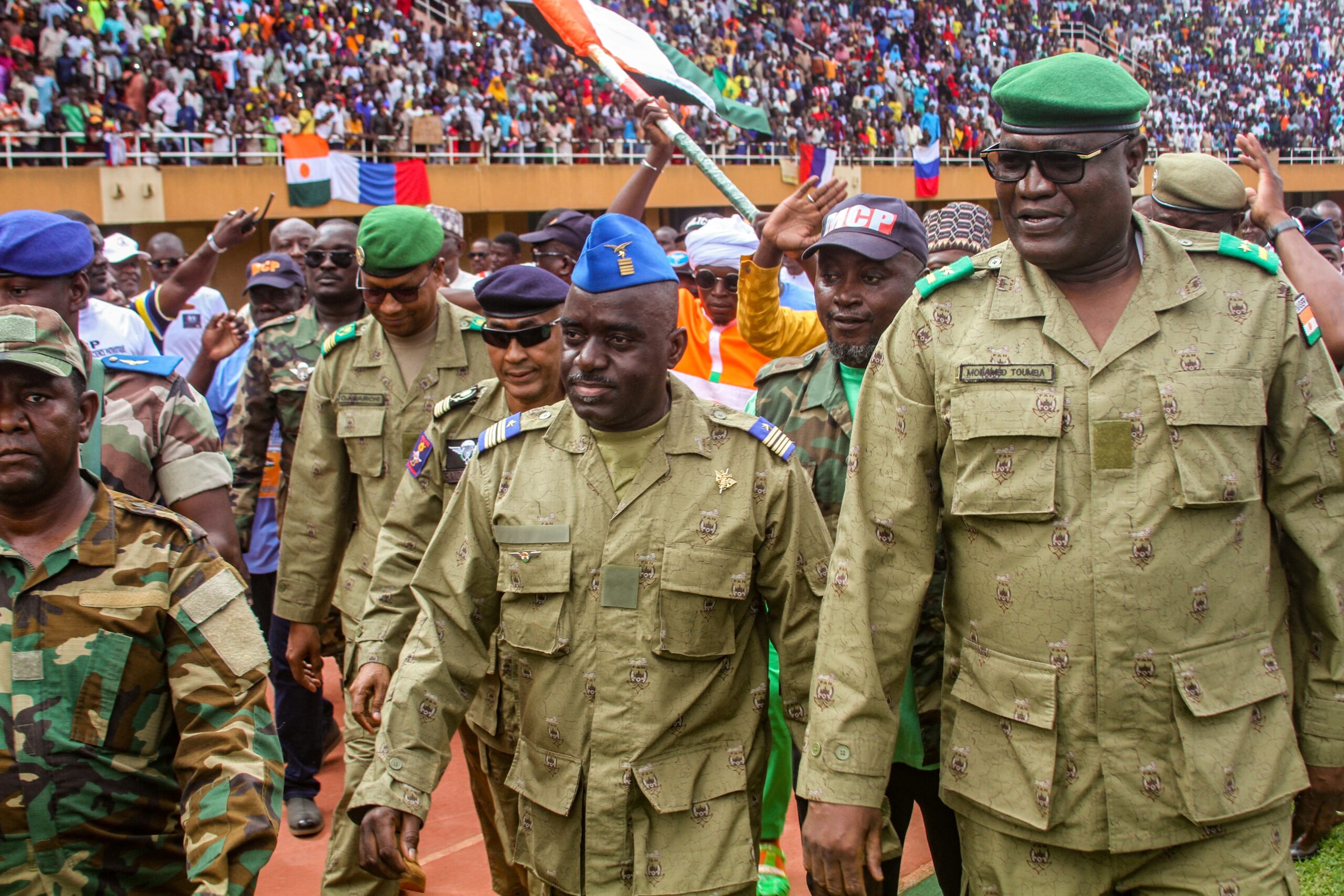
Niger coup: The junta, the failing diplomacy, and the dilemma of democracy
Supporters wave Nigerien’s flags as they rally in support of THE junta in front of the National Assembly in Niamey on July 30. Photo: AFP
By Kabir Adamu
Africa is facing a coup wave, with several countries falling to military rulers – the latest being the Central African country of Gabon.
However, one of the most complicated coups is that of Niger. It is more than a month since a group of soldiers unconstitutionally usurped the democratically elected government in Niger Republic.
Since then, the military junta, which now calls itself the National Council for the Safeguard of the Homeland (CNSP), is cementing its rule after gaining the upper hand in a shadow play with the “democratic world” led by the Economic Community of West African States (ECOWAS).
Bazoum still detained
The deposed leader, Mohamed Bazoum and his family, including a school-attending son, are still being detained, reportedly in deplorable conditions, at a holding facility in Niamey’s presidential palace.

The CNSP junta has rallied crucial internal support and that of a few other mostly military-governed countries in the region, such as Burkina Faso, Guinea and Mali, as well as that of Russia.
So far, it has rebuffed ECOWAS-led international efforts to restore constitutional order, including returning the deposed president to power – a slim possibility.
In doing this, the junta has proceeded to consolidate itself in power by forming a cabinet, appointing regional governors, and ramping up public support.
On August 26, 2023, the junta facilitated a solidarity gathering at the Seyni Kountche stadium, a 30,000-capacity facility in central Niamey.
An estimated 20,000 Nigeriens showed up at the gathering with vuvuzelas and waving the flags of Niger, Algeria, and Russia, with acrobats painted in the country’s national colours and putting on a show in the centre of the pitch.
Several held placards displaying solidarity with the junta and denouncing France and ECOWAS. France and its Western allies were sponsoring the alleged planned ECOWAS military intervention.

Regional blocs condemnation
ECOWAS held separate meetings on July 30, 2023, and August 10, 2023, and African Union (AU) Peace and Security Council held its talks on August 14, 2023.
The two bodies reiterated their condemnation of what they continue to describe as “the attempted coup” in Niger Republic and resolved to pursue diplomatic means, economic sanctions, and a possible military intervention to restore constitutional democracy in the country.
Since July 30, 2023, ECOWAS, in response to the coup d’état in Niger Republic, had imposed economic sanctions and boycotts, including the closure of borders, freezing of the country’s bank accounts in member states’ institutions and the stoppage of power supply from Nigeria as Niger relies on Nigeria for most of its electricity.
These sanctions have exacerbated the already dire humanitarian challenge in Niger Republic, with the UN warning that over 2 million children are at risk of starvation and inability to access vital aid and medicines.
ECOWAS also deployed several diplomatic emissaries to Niger aimed at resolving the situation.
These delegations, including one led by a well-respected former Nigerian military head of state, General (Retired) Abdulsalami Abubakar, and several Islamic scholars, got diverse reactions from the military officials.

The two bodies have reiterated their condemnation of what they continue to describe as “the attempted coup” in Niger Republic and resolved to pursue diplomatic means, economic sanctions, and a possible military intervention to restore constitutional democracy in the country.
Three-year transition plan
After the meeting, the junta indicated its readiness to dialogue. However, on the same day, the CNSP leadership, in a television broadcast, revealed a possible transition plan that could last up to three years.
ECOWAS rejected this three-year transition plan and reiterated its resolve to restore constitutional order in Niger Republic. It emphasized that it preferred diplomacy but would not hesitate to use force as a necessity.
Meanwhile, the relationship between the junta and the country’s former colonial power, France, has continued to deteriorate. In the aftermath of the coup d’état, and following France’s rejection of the coup d’état, the CNSP announced the cancelation of all military pacts with France.
This is in addition to the suspension of the licenses of some French media organisations in Niger Republic including Radio France International (RFI) and France 24. The CNSP also issued a 48-hour ultimatum asking the French ambassador in Niamey to leave the country.
In response, France rejected these actions arguing that the CNSP lacks the legitimacy to authorise to take such decisions.
There is chatter that the escalation of this sour relationship between the two former allies, may translate to the suspension of economic ties; a development that will impact the critical mining contracts implemented by French companies in Niger.

Western democracy
As for the United States, its response to the development in Niger Republic has been non-committal suggesting that it is attempting to balance its strategic interests and its overarching desire to promote Western democracy across the world.
The US is yet to label the action of the CNSP as a coup d’état and has proceeded to send several diplomatic emissaries to Niger Republic without any major achievements apart from the fact that the junta has essentially refrained from taking any particular action against US interests.
Labeling of the CNSP junta’s action by the Biden administration as a coup d’état could pose an impediment to further security assistance to Niger Republic.
The US has 1,100 troops in Niger Republic. It has a drone base near the city of Agadez, built at a cost of $100 million for intelligence and other security operations in the Sahel since 2018.
Several developments will shape the outcome of the Niger crisis, including how ECOWAS handles its earlier threat for a possible military intervention which has been rejected by most citizens and some member states.
Another issue is France and the US possibly harmonising their efforts and agreeing to cooperate and support a unified stance.
How Niger’s North African and Middle Eastern neighbours and other countries such as Türkiye respond to the developments and Russia’s actions after the death of Wagner’s boss, Yevgeny Prigozhin, are also crucial in shaping the outcome of the situation.
The author, Dr. Kabir Adamu, is the Managing Director, Beacon Consulting Ltd, an Enterprise Security Risk Management and Intelligence solutions provider in Nigeria and the Sahel.



